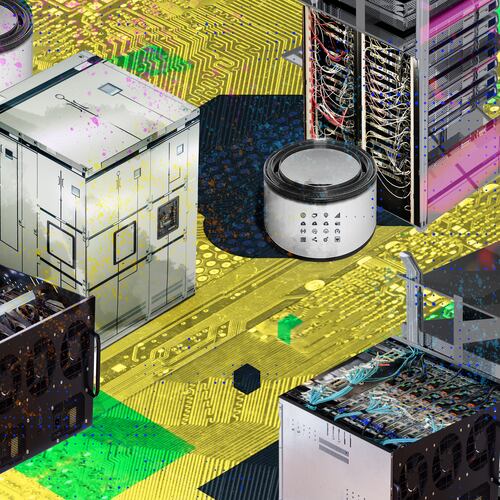All electric vehicles manufactured by Hyundai Motor Group at its assembly plant near Savannah since April 1 qualify for a $7,500 federal tax credit now that their batteries are sourced from a northeast Georgia factory.
SK Battery America in Commerce is supplying the lithium battery packs to the Hyundai Metaplant, located along I-16 in Bryan County. EVs are powered by batteries, not gasoline engines, and the battery pack is the largest component. Before the deal with SK Battery, the IONIQ 5s coming off the Savannah assembly line failed to meet the tax credit’s requirement.
To be eligible for the full credit, 60% of an EV’s battery components must be made domestically.
The Hyundai factory opened last October and is currently producing more than 200 EVs a day, a mix of IONIQ 5s, a sedan that is the company’s bestselling EV, and IONIQ 9s, a new model SUV that has yet to go on sale to the public. Cars manufactured at the Savannah-area plant prior to April 1 are not eligible for the tax credit although Hyundai is offering other pricing incentives.
Trip Tollison, the Savannah area’s top economic development official, cheered the newfound tax credit eligibility but emphasized that Hyundai announced plans for the Metaplant before the EV tax credit was passed and signed into law.
“It’s an awesome feeling to know that U.S. consumers are purchasing Hyundai products made right here in our region — especially when you consider that the first product rolled off the line less than 21 months after construction started on the facility,” said Tollison, who was part of the economic development team that courted Hyundai to Georgia.
Credit: AP
Credit: AP
The tax credit news comes as Hyundai acknowledged an EV battery manufacturing facility being built on the Savannah Metaplant site won’t open until next year. The battery factory, a joint venture between Hyundai and another South Korean company, LG Energy Solutions, was originally scheduled to begin production this summer.
A second Hyundai EV battery plant under construction in Georgia is also behind schedule. The factory, a joint venture between Hyundai and SK On near Cartersville, was projected to begin production in the second half of 2025 but is now slated for a 2026 opening. The facility will supply battery packs to the Savannah Metaplant, a Kia assembly factory in West Point and a Hyundai manufacturing facility in Montgomery, Alabama.
Reasons for the construction delays for the joint venture battery factories remain unclear. The Savannah area has been plagued by inclement weather — three hurricanes and a rare winter storm — going back to last August. A spokesperson for the Hyundai-LG facility did not respond to an inquiry about whether storms or supply chain issues contributed to the change in timeline.
As for the Cartersville project, a spokesperson said via email that “we continuously optimize our operations in line with customer plans and market trends.”
One possibility is a softening in EV sales that has affected Hyundai’s urgency when it comes to increasing its battery supply. EV sales in the U.S. continue to grow but at a more cautious pace than was forecast when Hyundai announced the Metaplant in 2022. Year-over-year sales were 7.3% higher in 2024 after gaining 49% in the previous year, according to a Cox Automotive analysis. Cox Automotive is a subsidiary of the same company that owns The Atlanta Journal-Constitution.
Adding to EV uncertainty are threats made by President Donald Trump and Congressional Republicans to eliminate the federal EV tax credit. The tax relief was part of legislation championed by Trump’s predecessor, former President Joe Biden, and passed by a Democratic-led Congress.
Trump has labeled the push for wider adoption of EVs at the expense of gasoline-powered vehicles a “transition to hell.”
At the Hyundai Metaplant grand opening in March, CEO José Muñoz reaffirmed the automaker’s commitment to expanding its EV business across all three of its brands: Hyundai, Kia and Genesis. Hyundai’s goal is to grow its EV portfolio to 23 models by 2030.
Yet, in that same interview, Muñoz said the Savannah factory would soon begin manufacturing hybrid vehicles as well as EVs to meet market trends. Hybrids are propelled by electric batteries that are charged while in motion by a traditional gasoline-powered motor.
“We will stay the course, and we will continue to produce more,” Muñoz said. “What I cannot change is demand.”
The SK facility in Commerce is a U.S. subsidiary of SK On — the same company involved in the battery plant under construction in Cartersville — and can supply enough battery packs to meet Hyundai’s existing production needs. The plant, located along I-85 an hour north of Atlanta, opened in 2022 and initially supplied Ford and Volkswagen with EV battery packs. The factory added Hyundai and Nissan as new customers this year.
Before April, Hyundai bought batteries built in an SK facility in Hungary. Those components now carry a 25% tariff announced by the Trump administration on March 26.
— Staff writer Zachary Hansen contributed to this report.
About the Author
Keep Reading
The Latest
Featured




